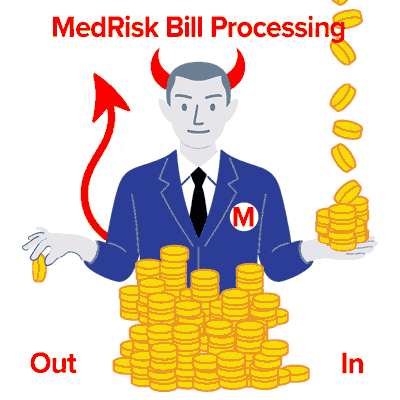Helmsman Makes Ransom Demand for Refund Request (Part 3)

Helmsman Management Services, LLC, a Third-Party Administrator (TPA), has refused to process a Second Review appeal submitted by a California physician who treated an NBC Universal employee injured on the job.
The reason for refusing to process the appeal is dumbfounding.
According to a Helmsman agent, the physician’s appeal will not be processed unless the physician complies with an invalid, unfounded request to send Helmsman a refund for the reimbursement Helmsman previously paid on the disputed bill.
Rather than processing the appeal, Helmsman is defying clear California law.
The state requires claims administrators to respond to Second Review appeals within 14 days—no exceptions, no conditions. By refusing to process the appeal until the physician submits a refund, Helmsman is substituting its own rules for state law.
The facts are straightforward: a physician followed the law in disputing an underpayment, and Helmsman refused to abide by the legal process, undermining the legal safeguards California established for workers’ compensation billing and appeals.
Every California employer and insurer that contracts with Helmsman should be on high alert. If Helmsman treats physicians this way—ignoring state-mandated processes and imposing its arbitrary conditions—what does that mean for how the TPA treats injured workers?
Employers have a legal and ethical obligation to ensure their employees receive timely and lawful care. A TPA that disregards payment requirements may be flouting other obligations.
Helmsman: A Tragicomedy of Errors
This troubling episode began when Helmsman failed to pay a physician treating an NBC Universal employee injured on the job the correct reimbursement as required by a February 2025 fee schedule update.
Following proper protocol under California law, the doctor submitted a Second Review appeal to dispute the incorrect reimbursement. But instead of responding as required by law, Helmsman ignored the appeal.
Helmsman sent a letter demanding that the doctor return the (insufficient) reimbursement, claiming that the medical services were “not related to our workers’ compensation claim.”
State records confirm the claim is Helmsman’s, and the TPA had already paid 19 other bills for the same claim without issue. Accordingly, the doctor correctly ignored the refund request.
daisyBill Steps In: Appeal Held for Ransom
To investigate Helmsman’s refusal to process the Second Review appeal, daisyBill called the number listed on Helmsman’s Explanation of Review (EOR).
The phone call revealed that Helmsman would not process the appeal unless and until the provider capitulated to the (invalid) request for a refund.
An excerpt from our conversation is below (see the full transcript at the bottom of this article):
Bill Review Agent:
“…you cannot file an appeal, or the appeal that you submitted cannot be processed, because there is a refund of $287.94 that Liberty Mutual is waiting for from the provider.”
daisyBill:
“And just to confirm—because there is a refund request, Liberty Mutual is refusing to process this reconsideration?”
Bill Review Agent:
“Yes. Unless it has already been settled.”
To clarify, Liberty Mutual is the insurer, while Helmsman serves as the TPA responsible for compliance on Liberty Mutual’s behalf.
The call transcript makes it plain: Helmsman/Liberty Mutual effectively—and illegally—blocked the appeal to force the doctor to submit a refund.
Helmsman’s IBR Loophole?
daisyBill is now forced to escalate the dispute to Independent Bill Review (IBR)—a state-level process that costs $195 and requires extensive documentation.
But Helmsman’s behavior creates a complication: when requesting IBR, the Division of Workers’ Compensation (DWC) requires the physician to submit the final Explanation of Review (EOR) issued in response to the Second Review appeal. Because Helmsman refused to issue that EOR, daisyBill can only submit the refund letter and phone call transcript.
If the absence of a final EOR disqualifies the provider from pursuing IBR, Helmsman’s non-response will have effectively created a loophole to evade the appeals process entirely—not by disputing the merits of the dispute, but by making an end-run around the law.
A System Ripe for Abuse
This situation highlights how administrative friction and selective enforcement of the law can drive providers out of California’s workers’ compensation system.
If TPAs can stall appeals by arbitrarily demanding refunds—which physicians have no legal obligation to provide—then California’s legal protections for providers are only as strong as a claims administrator’s willingness to follow them.
Employers that use Liberty Mutual should ask hard questions: Is Helmsman managing your claims? And if so, what standards of legal compliance does the TPA apply to your injured employees’ care?
Based on this case, the answer may not be a good look for your company.
The full transcript of our call with Helmsman (with our emphases) is below.
Bill Review Agent |
…All right, upon checking here, you cannot file an appeal, or the appeal that you submitted cannot be processed, because there is a refund of $287.94 that Liberty Mutual is waiting for from the provider. |
Bill Review Agent |
I'll check the refund letter. It says here that: "Please be advised Helmsman Management Services has identified an overpayment of $287.94. Services not related to our workers' compensation claim." Do you have this refund letter already? |
daisyBill |
Yes. |
Bill Review Agent |
Okay, you need to settle the refund first. Once you settle it, then you can submit the appeal again and the medical bill review can process it for you. If you do have other questions or disagreement about the refund request, there is a person who you can contact on the refund letter. You can reach out to her. |
daisyBill |
Do you have that information handy as well? |
Bill Review Agent |
Yes, would you like me to provide the information over the phone? But you can also find it on the refund letter. |
daisyBill |
Yes, please provide the information to me. |
Bill Review Agent |
Yes, should there be any questions or disagreement with this refund request, please submit your correspondence to an email address or fax. I'll provide it to you. Fax number is [redacted] and then the email address is [redacted]. |
daisyBill |
Okay, thank you. And just to confirm—because there is a refund request, Liberty Mutual is refusing to process this reconsideration? |
Bill Review Agent |
Yes. Unless it has already been settled. Once settled, you can submit another bill and they can process it for you. |
Know what you’re owed, and keep track of every cent with daisyBill. Click below to see how we make life easier for providers who treat injured workers.
WORKERS’ COMP BILLING: SOLVED
DaisyBill provides content as an insightful service to its readers and clients. It does not offer legal advice and cannot guarantee the accuracy or suitability of its content for a particular purpose.



.gif)
